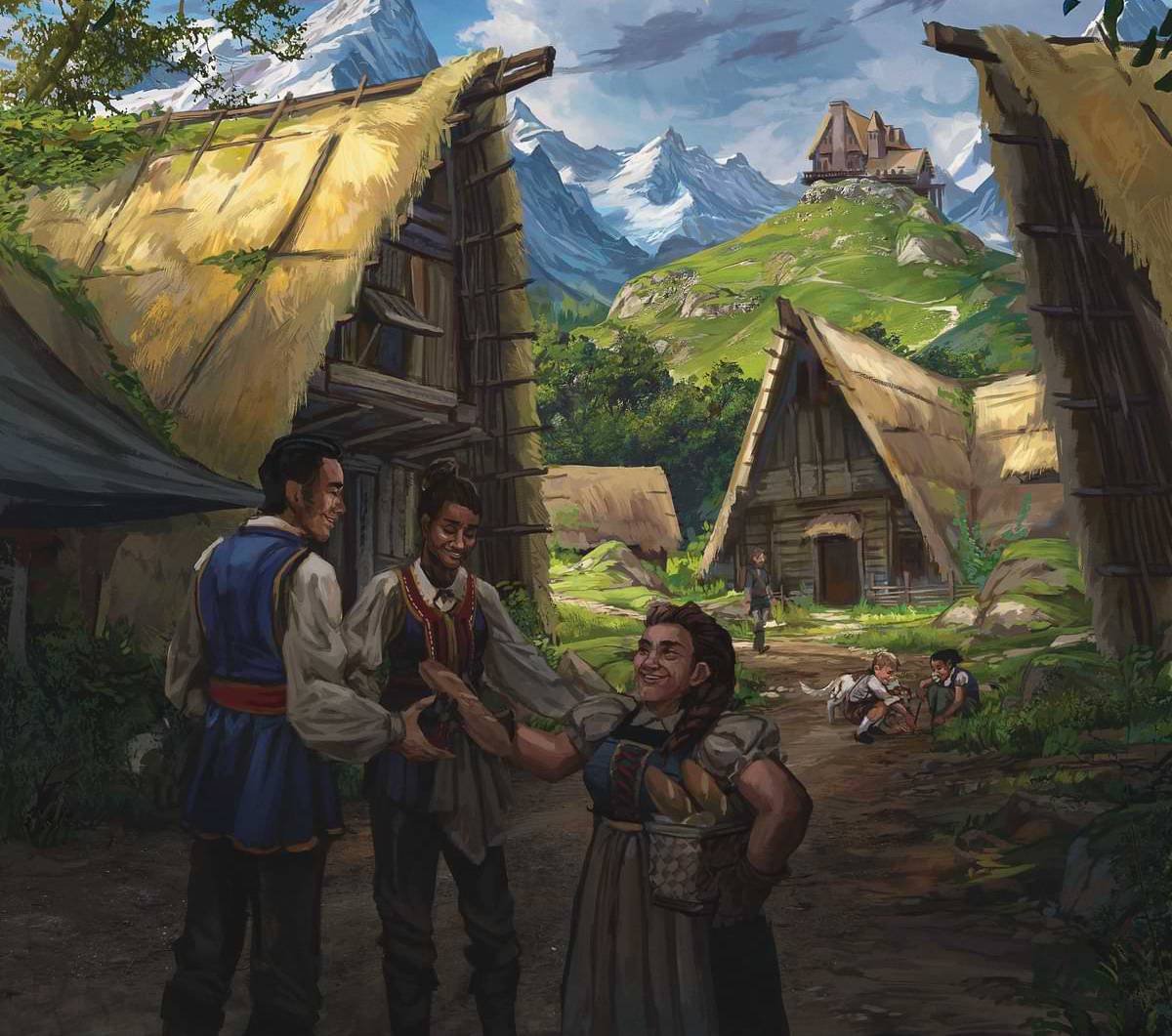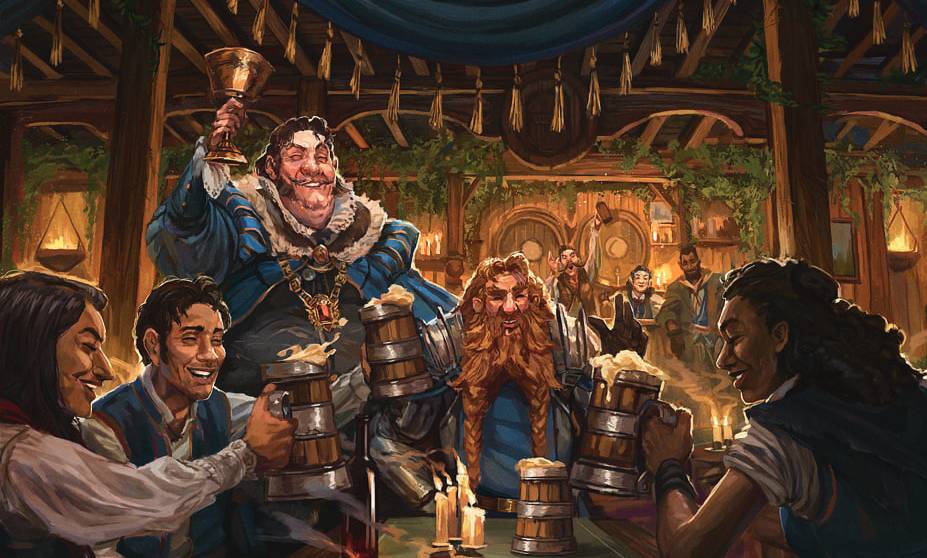After a long adventure, nothing feels better than getting back to your hometown. The familiar streets, routines, and people all give you a sense of safety and calm. Most importantly, you get to go home. Home is where all your stuff is. You get to walk in the door, kick off your boots of elvenkind, and change out of your armor and into your comfy pants.
Having a place that your players can come back to between adventures is often overlooked in long-term campaigns, but is certainly something present in Phandelver and Below: The Shattered Obelisk. In this article, we’re taking a look at setting up a hub city and how to give your players a base of operations.
- Establishing a Hub City in Your Campaign
- Phandalin As a Home Base
- How to Run a Hub City
- Setting Up a Base of Operations
Establishing a Hub City in Your Campaign

Hub cities are valuable tools to ground your campaign. Once established, they can be excellent set pieces to sow story seeds, foster character development, and catalyze plot twists.
A hub city is a centralized location where your adventurers can rest, recuperate, and prepare for their next quests. Unlike a city campaign, where the entire adventure takes place in a single city, hub cities are meant to be used as a home base to strike out from on adventure.
When you’re looking to set up a hub city for your players, it’s important to think about the campaign you’re trying to run. A political intrigue-type game about competing city-states will benefit from having a city like Baldur’s Gate as the party’s hub city, whereas an adventure focused on exploring ruins and delving into dungeons might benefit from a remote settlement like Phandlin.
Phandalin has been used as a hub in Lost Mine of Phandelver, Dragon of Icespire Peak, and now in Phandelver and Below: The Shattered Obelisk. The latter being the most extensive use of the city, as the adventure runs from 1st-12th level and features several dungeon crawls in the surrounding area.
Phandalin has some defining characteristics that allow it to thrive as a hub:
- The townsfolk need the player's help. Even goliath barbarians with a Strength score of 20 want to feel wanted. By helping the townsfolk solve their problems, the party creates a sense of appreciation from the people of Phandalin and make it a more habitable place to settle down and spend some downtime after adventures.
- They have supplies for the players. Phandalin contains a trading post for adventuring gear, an armory for weapons and armor, a shrine, and, most importantly, two bars. While it isn’t a bustling metropolis, it provides adventurers with some opportunity to go shopping and spend their well-earned gold.
- It contains plot hooks. Phandalin is full of NPCs who need the party’s help in one way or another. While some of these quests are subplots, the town contains story seeds central to the adventure. This is the main thing that will keep the party returning in the early days of establishing the settlement as a hub.
- It’s close to adventure. When the party is striking out to Wave Echo Cave, Cragmaw Castle, or one of the surrounding quests, Phandalin is usually the most convenient location for the party to return to when they need to rest and restock.
How to Run a Hub City

Whether you’re playing an official adventure or crafting your own campaign, it’s important to make the hub city feel dynamic and lively.
If your hub is stale and doesn’t respond to the campaign's events, players can get detached and generally bored by the notion of returning. Done right, however, and returning to these hubs can be something that players eagerly anticipate as they head home from their adventures.
NPCs
It's one of the laws of the universe that players will always fall in love with NPCs you had no intention of being more than a one-time guest appearance. While that’s just one of the things you have to roll with as a DM, you can also use it to your advantage to build out hub cities.
Whether it’s the goblin bard that plays at the party’s favorite watering hole or the quirky owner of a magic item shop, once the party has made a connection, interactions with these key NPCs will help keep your city feeling alive.
Side Quests
Not every conflict the party faces has to determine the fate of the multiverse. Hub cities are an excellent opportunity to break up a serious primary campaign with fun subplots. Maybe the city council comes to the party to deal with a giant alligator in the sewers, or perhaps an old lady just needs help getting her cat out of a tree.
These little side quests help build character relationships and make players care more about their hub city. Then, when it comes time to save the world again, they’re refreshed and ready for some real stakes.
Downtime
Speaking of ways to break up the campaign, sometimes the players just need a little R&R. When you have a hub city to go back to, your players can think of their characters in an entirely different way than when actively playing them in an adventure.
Sure, your wizard can cast fireball to blow their foes to pieces, but what do they do for fun? When your players are invested in the hub, they could get involved in local politics, a guild that interests their character, or some of the various other downtime activities listed in the Dungeon Master’s Guide.
Setting Up a Base of Operations

What’s a hub city if you don’t have a home base? More often than not, a base of operations is acquired around the same time the party saves the city they’ll call their home. These locations can be purchased, but c’mon, 50,000 gp for a keep? Plus, roughly 3,000 gp a month for upkeep? Real estate prices truly are getting out of hand.
If you’re looking for ways to give your players a base without making them fork over cash, check out this homebrew rollable table:
| d6 | Result |
|---|---|
| 1 | The mayor gives them an abandoned manor at the city limits as thanks for saving the town. |
| 2 | They receive a ramshackle inn in exchange for completing a quest (à la Waterdeep: Dragon Heist). |
| 3 | They stumble across an abandoned dwarven home carved into a rock just outside the city. |
| 4 | One or more players get a spot on the council, providing them with a city residence. |
| 5 | After completing a quest for the mage’s guild, they’re given a permanent magnificent mansion that can only be accessed from a certain location in the city. |
| 6 | The party becomes the city’s rulers and takes up residence in the castle at the center of town. |
“But,” you might be asking, “why does the party need a stronghold? Can’t they just grab a room at the local inn?” And while they could just spend their downtime in a hotel, let’s explore some indisputable evidence as to why every party needs a base of operations:
A Place to Call Their Own
Every group of heroes (or villains, for that matter) worth their salt have a base. The Avengers have Avengers Tower, the Justice League has the Watchtower, and the Masters of the Universe have Castle Grayskull. Having a dedicated space offers players a canvas on which they can leave their mark on the world, both literally and metaphorically. It's also a place where they can store their loot, take on projects, and perhaps even start a side business.
You could even task your party with creating a map of their base. That way, they can visualize their space more effectively, and it will take work off your plate when you inevitably have enemies invade their compound for a fight (evil DM laughter).
Setting Up Permanent Defenses
Speaking of invasions, players will undoubtedly want to set up some home defense systems, especially if they’re storing the powerful (and probably cursed) magic items they find during their adventures there.
There’s a sizable subsection of spells and effects meant to make permanent residences more defensible. Hallow, guards and wards, and glyph of warding all have long casting times and cost a lot of gold, but they make their protected area much safer against supernatural and mundane incursions.
You could also flip through the Player’s Handbook and see that skilled hirelings—which include mercenaries—only cost 2 gp per day, so you could just contract out your guard force instead.
And while we’re talking upgrades, you’ve got to get yourself a permanent teleportation circle. It’ll only take a year and cost around 18,250 gp.
Your Keep Awaits
Providing players with a hub city and base of operations can add layers of depth and engagement to your D&D campaign. It allows players to feel rooted in the world, offers downtime activities, and provides a place where players can devote their hard-won resources.
When your players are nomads, going from one city and quest to the next, they can quickly come to dismiss the needs of everyday citizens in your world. Once they have their own citizens to care about, the emotional connection will make campaign events feel much more impactful!
Mike Bernier (@arcane_eye) is the founder of Arcane Eye, a site focused on providing useful tips and tricks to all those involved in the world of D&D. Outside of writing for Arcane Eye, Mike spends most of his time playing games, hiking with his girlfriend, and tending the veritable jungle of houseplants that have invaded his house.








-
View User Profile
-
Send Message
Posted Sep 3, 2023Ah, but have you seen the property taxes on a 50k house? 5 percent per year, payable to the Crown... 2,500, that's not so bad, but...
What about the ten years of back taxes that the players are now responsible for? That 25,000 gold piece bill? You're gonna need a bigger Bag of Holding for all those coins, hope nobody gets wind of the players moving that much cash around town... and those taxes are due in 30 days, and if not paid:
I guess the players will need to go on a high-risk adventure to raise money fast. Or maybe discover that the tax collector is secretly a doppelganger or cultist. Or do another good deed for the town for the monarch to waive the taxes. Or take on the debt collector agency (secretly run by the local thieves' guild, now the Guild is mad at the players too, and it will take a favor to them to get the Guild off their backs...
Did we mention the Home Owners' Association, made up entirely of devils, blood-sucking vampires and other fine upstanding citizens, led by the warlock Kharen? She wants to speak to the player group's manager.
Yep, Home ownership is kinda like that.
-
View User Profile
-
Send Message
Posted Sep 3, 2023As someone aspiring to be an Evil DM, I approve of this idea >:)
-
View User Profile
-
Send Message
Posted Sep 3, 2023This is genius! Make them feel like they got it free, but then choke them quietly with taxes which require them to raise money quickly--adventure time?
-
View User Profile
-
Send Message
Posted Sep 3, 2023Something something something MCDM something something strongholds and followers
-
View User Profile
-
Send Message
Posted Sep 4, 2023Yep!
It's not a house. It's a campaign arc.
It's a trap.
-
View User Profile
-
Send Message
Posted Sep 4, 2023Earthquake is unfortunately two small to destroy a city, but is good for completely eliminating a few buildings. You can also cast it more times a day.
-
View User Profile
-
Send Message
Posted Sep 5, 2023You'd better believe it's a trap! And let's not forget the cost of building walls around the mansion, coordinating the building of such defenses, and when it's all done and the PCs are comfortably kicking back, their minions raise the alarm and they realize their fortress is suddenly under siege by some past enemy they didn't quite get rid of and is looking for revenge. The PCs had better have thought about siege defense tactics/strategy and logistics. Gotta keep your defenders fed and rested. What? The PCs didn't think to keep their forces stocked with food and spell materials. Pity. The sieging enemy seems to have.
Anyone who thinks getting a "free" mansion isn't a problem simply doesn't have any imagination. Geez, read up on medieval history and warfare. It's one huge multi-century D&D campaign that is financially crippling. There is always something for players to spend all their cash on.
-
View User Profile
-
Send Message
Posted Sep 5, 2023Entitlement and a dying work ethic, these whippersnappers are ruing the economy. When I was young…
-
View User Profile
-
Send Message
Posted Sep 5, 2023The whole stronghold part is very cool and well written
-
View User Profile
-
Send Message
Posted Sep 6, 2023Lets rephrase, A Magical Mansion that can only be accessed by a certain part of the city that uses the statistics for Magnificent Mansion. It's not that hard
-
View User Profile
-
Send Message
Posted Sep 7, 2023Something something something Kingdoms and Warfare something something.
I have and love these books. But could use an update specifically for an artificer's workshop stronghold.
-
View User Profile
-
Send Message
Posted Sep 7, 2023If the city rulers gift the group with a house, keep, or other establishment, have them staff the place and cover the cost of guards, too. Later, when the city rulership changes hands, the villains have a foot in the door.
Alternately, if you don't like compromising the player's home, then trusted servants on the villain's payroll whose loyalty is now with the PCs (and the ousted former ruler who originally hired them) can provide a great way to turn the tables on the villains.
-
View User Profile
-
Send Message
Posted Sep 7, 2023Yikes. Some people just can't accept that the rules are just cute little suggestions and that slavishly following them to the letter is the mark of a small mind. The point of the game isn't in 'rules adherence' it's in having fun crafting a joint narrative. 'The books' are just guidelines, to be ignored. There's no need to rephrase anything for pedants.
-
View User Profile
-
Send Message
Posted Sep 7, 2023It can if the DM says it can. Basic rules, the DM can change anything they like. Pedantry will only ruin the game for yourself and others.
-
View User Profile
-
Send Message
Posted Sep 8, 2023As a note Phandlin gets referred to as being a city several times in the article. It is a relatively small town (even by the Sword Coast population standards) and in the middle of nowhere. This will have a few effects not listed in the article, such as:
Items available for sale and people willing to buy items from you are significantly reduced.
Everyone knows each other, so how a PC acts to a single NPC can have a significant effect on how the players are treated.
-
View User Profile
-
Send Message
Posted Sep 8, 2023I use an established village in one of my games that helps create the characters backstory and reasons to know one another. The village consists of 3 sections. The first is an entire burrow of gnomes living in a hill side, The second section is where human and halfling homes are scattered around the base of the hill. The third is an elven manse made of magically woven wildflowers. The whole village is guarded by bees and giant foxes and various wild animals. The largest dwelling was a 3-story fortified gristmill built along a clear water stream. It's run by a wizened old dwarf druid. The players are members of the community. As a rite of passage, each individual had to build onto one of the 3 sections to make a place for themselves. Obtaining the materials needed to build their homes was the first several adventures. It worked out really well.
-
View User Profile
-
Send Message
Posted Sep 8, 2023Sheesh! Talk about no hope odds!! That'll take like 3 wishes and a soul wrack to get out of!!!!
-
View User Profile
-
Send Message
Posted Sep 8, 2023“But,” you might be asking, “why does the party need a stronghold? Can’t they just grab a room at the local inn?” - Mike Bernier asks in the article...
Perhaps he knows something about the Bastion system that the UA playtest videos were alluding to a while back...
-
View User Profile
-
Send Message
Posted Sep 8, 2023Good point